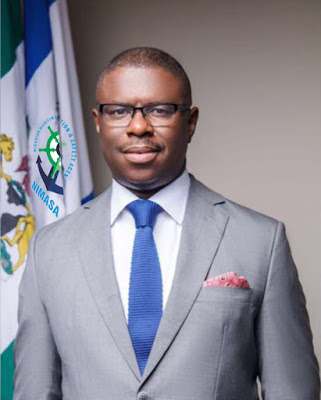 |
| Dr. Dakuku Peterside, DG NIMASA |
and Safety Agency (NIMASA) has defined its strategic plan to end Cabotage
waivers for non-indigenous ship owners within the next five years.
Director General of NIMASA, Dr.
Dakuku Peterside, in a stakeholder’s engagement in Lagos on Wednesday, said the
road-map aimed to actualise full implementation of the Cabotage Act, 2003, for
the promotion of indigenous participation in shipping in Nigeria.
Which became effective 2004), was to enable Nigerian ship operators engage in
the coastal trade of carrying Nigerian-generated cargo, as its provisions
included that such ships must fly Nigerian flag, ships be owned by Nigerians,
built in Nigeria and crewed with Nigerians.
efforts to make Nigerians benefit from the cabotage regime, it was able to
double the number of Nigerian crew onboard vessels as a result of an initial
six-month marine notice to have only locals for that cadre.
said: “In that marine notice we informed operators
that we shall no longer entertain any form of application for manning waiver
safe for captains and chief engineers. At the time, it was for six months and
we noticed that under six months we literally doubled the number of Nigerian
onboard vessels by simply publishing and enforcing the new cabotage strategy.
then, we have had series of engagements with stakeholders and they agree with
us that it is very possible to stop the waiver regime in the cabotage trade.
Today is an important step in that direction.”
lower interest rates in discussions with the Central Bank of Nigeria (CBN) and push
for favourable policy to enable the Nigeria Customs Service review duties on ship-building
materials. That way, indigenous players would be able to compete favourably
with foreign counterparts.
discussions with the apex of the Nigeria Customs and the Ministry of Finance,
to look at the tax regime, as the current regime is not favourable to
indigenous operators.
components to build vessels in-country and what tax incentives can be given to
those who build vessels in-country. Those engagements are going on at the
office of the Vice President, to look at the possibility of creating a number
of incentives for those who can build vessels in-country. We believe that if
that is done, a lot of investments would be done in that area.
Content Development and Monitoring Board (NCDMB). To that extent, we have
commissioned an audit of all ship –building yards in the country, to identify
the level of support we can give them to enable them come back on stream fully.
we want certain categories of vessels to be built in the country, so that we
will put an end to bringing literally all vessels we need from outside the
country, and create job for those people and create unemployment here by
patronising foreign built vessels.
them to compete with their foreign counterparts. Foreigners bring in vessels
for a short period and they have a special tax regime and so they pay little to
nothing, their vessels will come into the country, work and leave. Whereas, if
you are bringing vessels into the country, you are charged full range of all
taxes applicable and at the end of the day you cannot compete with your foreign
counterparts,” Dakuku said.
had continued to boost the Nigerian Seafarers Development Programme by training
about 2000 cadets for seatime in various schools. It has also seen to the
take-off of the Nigerian Maritime University, and still giving support to various
maritime institutes, in its effort to growing manpower for the industry.
in the area of the Nigerian Ship Registration Office (NSRO), the Engr. Emmanuel Ilori-led stakeholders committee would
be out rewarding results to reposition the ship registry to match global
standards.
had discussions with Lloyds London, ABS of the USA and other major
classification societies and ship registries in the world. And a number of them
are excited to work with us in Nigeria.
certain that we will re-position the ship registration office and make her one
of the best in the world. We will give a number of incentives and we will give
confidence to our people to register their ships under the Nigerian Flag and people
will be proud of it again.”
